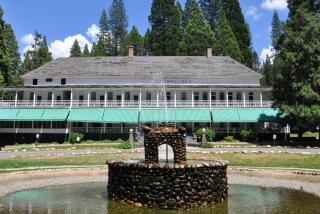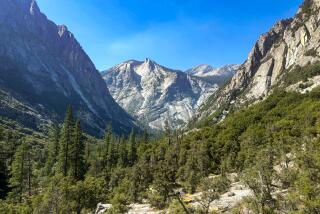On a weekend escape to Death Valley, witness the rebirth of a beloved historic hotel
Death Valley is less than a five-hour drive from Los Angeles, but it is as desolate as a planet in a galaxy far, far away. That’s why in 1977, for the first “Star Wars” movie, George Lucas shot some scenes here. Today, “Star Wars” fanboys take selfies at the film locations even in summer when the temperature tops 110 degrees. On a cool fall day, my husband, Paul, and I set out for the largest, hottest and driest national park in the contiguous U.S. for another reason: to visit the rebirth of its beloved historic hotel, the newly refurbished Inn at Death Valley. (The park and its private concessions are open despite the partial government shutdown.) The tab for two: $424 per night for the room, $200 per day for food, plus taxes, resort fees and gas.
THE BED
The Inn at Death Valley, opened in 1927 as the Furnace Creek Inn, is the jewel in a 338-acre resort complex that includes the more casual Ranch at Death Valley, campgrounds, restaurants, a spa, golf course and more. After an 18-month $100-million renovation, the complex lives up to its new name: the Oasis at Death Valley. We stayed in one of the 66 elegantly updated rooms at the inn, which retains its original California Mission style down to the thick stone walls, homey fireplaces and vibrant tile work. What’s new are 22 spacious one-bedroom casitas and nearly 500 palm trees. I took a refreshing swim in the warm spring-fed pool, just as Hollywood stars Clark Gable and Carole Lombard did on their honeymoon.
THE FOOD
For breakfast in the dining room, we savored chilaquiles with queso fresco and a side of the inn’s legendarily luscious date bread. One evening we ventured to the Ranch’s Last Kind Words Saloon for dinner. With its colorful Old West décor, it was a lively place to share meaty barbecued baby back ribs with prickly pear barbecue sauce.
THE FIND
We reached a new low at Badwater Basin, but in a good way. At 282 feet below sea level, the barren salt flat is the lowest point in North America. We walked onto the vast expanse, bent over in what felt like a gale-force wind. When we asked a passing park ranger how strong it was, he chuckled. “That’s not a wind,” he said. “In Death Valley, we call anything less than 80 mph a ‘breeze.’ ”
THE LESSON LEARNED
The beauty of Death Valley is most astounding at sunrise and sunset, what photographers call “magic hour.” Make sure you’re in the right place at the right time for both. At Zabriskie Point, the rising sun threw a spotlight on Manly Beacon, a crooked spire rising out of the badlands, turning its washed-out sand color to gold. At the Artists Palette viewpoint, the rays of the setting sun revealed bands of red, blue and green in the mineral-rich hills.
Inn at Death Valley, the Oasis at Death Valley, Death Valley National Park, Highway 190, Death Valley; (800) 236-7916, oasisatdeathvalley.com. Wheelchair accessible.
More to Read
Sign up for The Wild
We’ll help you find the best places to hike, bike and run, as well as the perfect silent spots for meditation and yoga.
You may occasionally receive promotional content from the Los Angeles Times.






